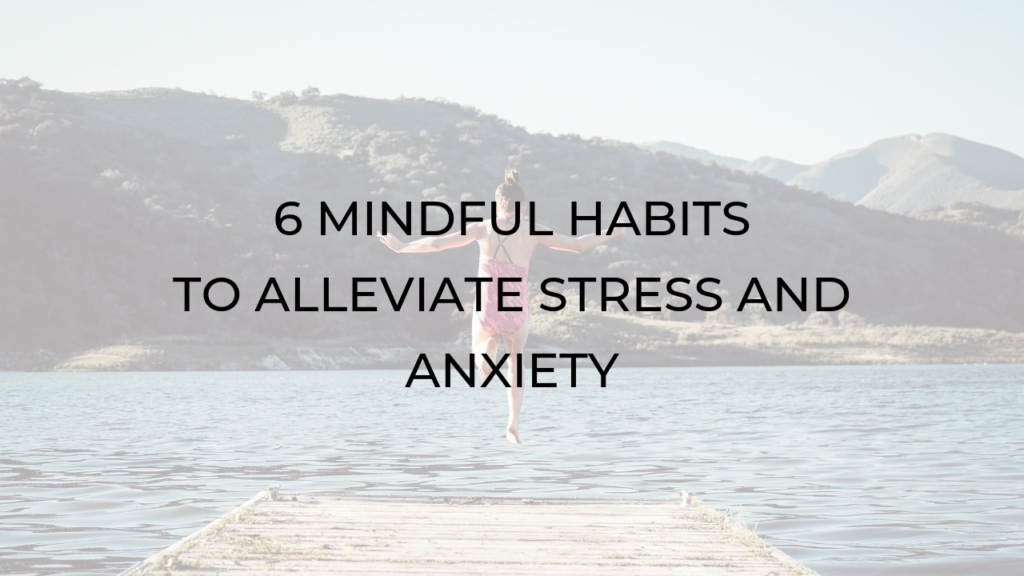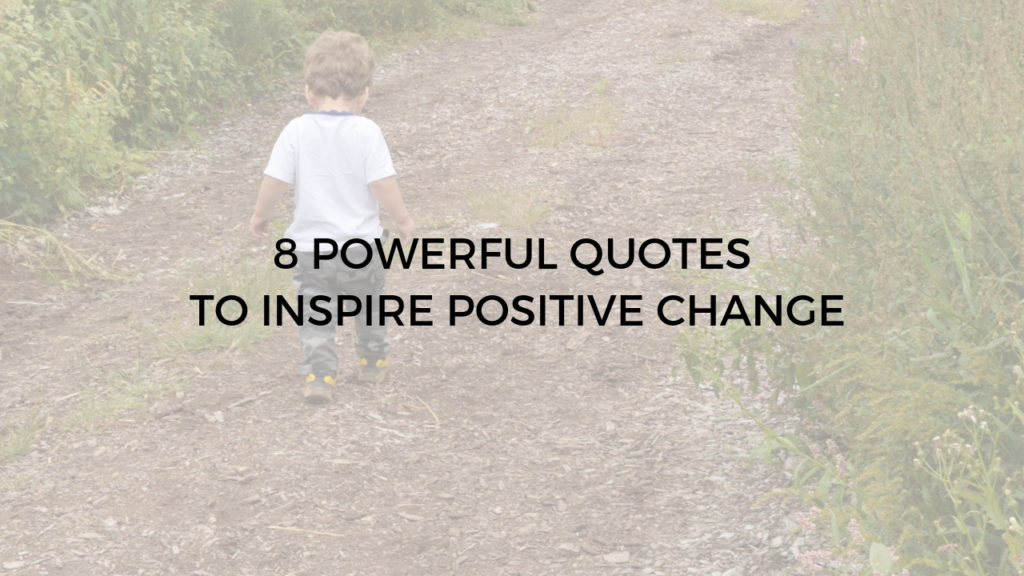Did you know that it’s normal to get anxious or stressed from time to time? In fact, getting stressed or anxious can actually be beneficial when we need to stay alert, focused, and energized in cases of emergency and high alert situations.
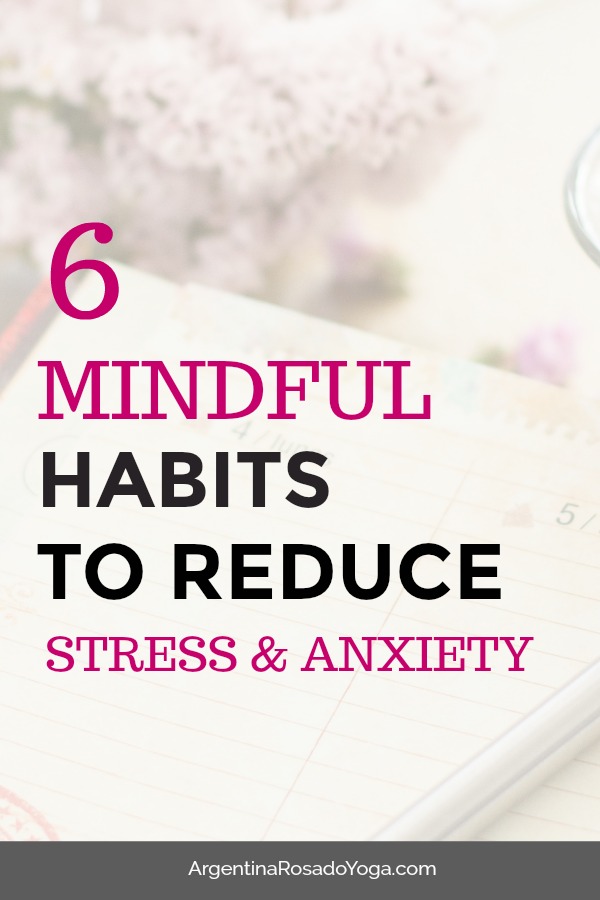
But let’s face it. Most of the time we get stressed about non emergencies and non life-threatening situations. What happens then is that the stress response becomes overactive and we approach conditions such as long-term stress and anxiety disorders.
Fortunately, there are small things we can do to help minimize unnecessary stress and anxiety. Not only that, but small habits like going for a walk, or journaling can help us find balance in cases of accumulated stress and chronic anxiety.
Of course, as a yoga teacher, my number one recommendation would be to create a yoga and meditation habit.
But the following mindful habits are top recommendations as well:
1. Make to-do lists
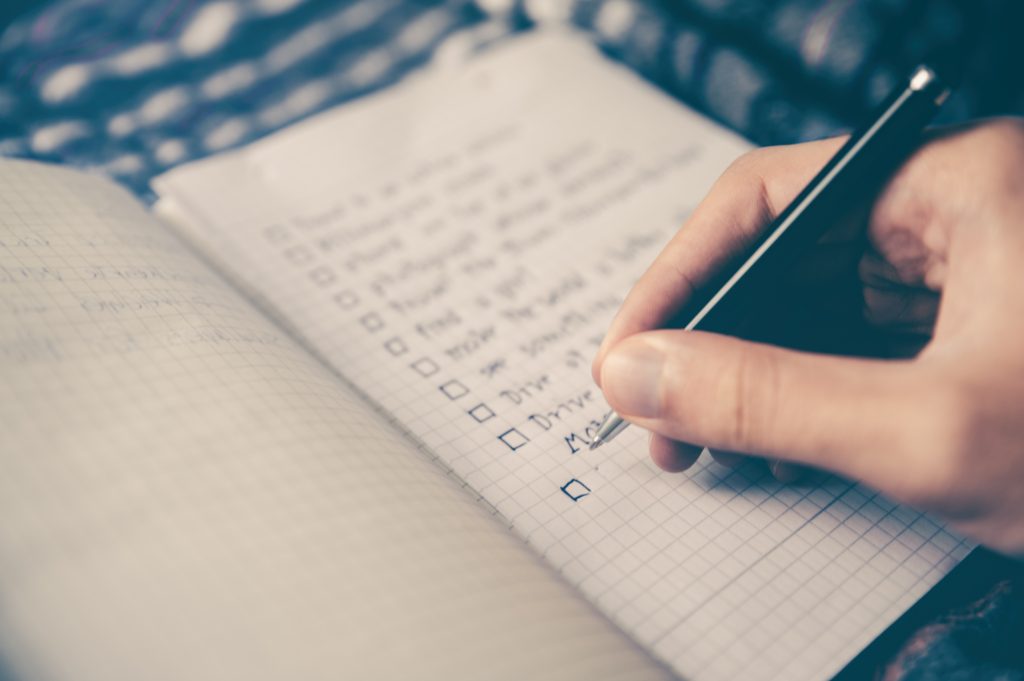
One of the things that create anxiety is when we have multiple tasks floating around in our minds. Even worse, sometimes we have an idea of the things we need to accomplish on a given day, but we don’t necessarily know what to do to achieve them. We feel lost, scattered, and we don’t know where to begin.
Taking the time to sit down and think about the goals we want to achieve on a daily basis minimized the burden of trying to decide what to do first, alleviates anxiety, and sets us up for the day.
Here’s what you can do.
Early in the morning, sit down and close your eyes. Try to visualize your entire day, from start to finish. Visualize as much detail as you can – what you’re doing, where you’re doing it, and who you’re with.
Then, map out your day in paper. Write down all of the tasks you need to complete in order to achieve your daily goals. For example, if one of my goals is to publish a blog post, my list of tasks can be: draft my blog post, proofread blog post, create & edit images, publish blog post, share on social media, etc.
In other words, break down each goal into smaller tasks that need to be completed.
Make sure to also write out the times you’ll use to complete each task.
And please, please don’t forget to schedule breaks.
2. Practice Minimalism

I don’t know about you, but I can’t even take a nap when there’s a pile of dirty dishes in the sink and stuff lying around all over the place.
Let’s put it this way – the more things you have lying around, the more things your mind is being drawn to. Whether you’re conscious of it or not, it’s hard to think straight when you have clutter around you.
Here’s what you can do:
Do monthly clean-ups. Check your closet, kitchen cabinets, and other storage areas and identify things you no longer need. A good rule of thumb is that if you haven’t used it in say, 4-6 months, then perhaps you don’t need it. Donate, sell online, do a garage sale. Your trash can certainly be someone else’s treasure.
Clean out your fridge, desk, and other common areas. Try to store things don’t need on a daily basis, and leave out the ones you do (i.e. your computer, pen, paper, etc.)
Do a little clean up before bed so that everything is clear when you wake up.
In the morning, make your bed first thing.
Now, this habit is not about being obsessive compulsive. This is more about creating a mindful, stress-free environment where one can think clearly, be more productive, and get things done without the stress and anxiety.
3. Spend time in Nature

I recently came across a thing called Ecotherapy, which is a practice that involves healing by spending time in nature. According to Harvard Medical School, activities involving time in nature such as listening to nature sounds or just plain silence, help stimulate the relaxation response, which then lowers stress hormone levels, blood pressure, and create calm and balance for the mind and body. Pretty cool stuff!
There are many scientific studies that suggest the healing effects of spending time in nature. However, I’d like to share my personal experience when I spend time and nature and how it affects my mood and stress levels.
As you may already know, I lead yoga retreats around the world. When I’m on retreats, which always take place in beautiful, rural places in the middle of pure nature, my mental and physical stress seem to shift in the most beautiful way.
I somehow sleep better and wake-up much earlier. I don’t know what it is but I do. This may have to do with the fact that people in more rural areas tend to wake up earlier than those in more urban areas. No explanation except, well, the natural setting.
I also tend to lose track of time when I’m on retreat. A lot of times I catch myself wondering what day or what time it is. And it’s not just me because it happens to the entire group as well. Losing track of time can feel weird at first, but it feels liberating.
Now, you don’t necessarily have to be on a yoga retreat to spend time in nature. It would be nice, yes. But you can do something simple like going to your nearest park, sitting on the grass, and feeling the earth beneath you.
It can be as simple as taking a walk and being aware of the sun or breeze against your skin. Or watching the moon and stars at night.
You may not be in complete nature, but the simple act of bringing your awareness to these things will make you feel grounded and connected to mother earth.
Here’s what you can do
If you can’t travel somewhere in pure nature or join a yoga retreat, simply take a walk outside. As you do this, become aware of 1-3 things from mother nature (i.e. sky, clouds, the sun, the rain, birds, etc.).
Simply be aware of your connection to them. Because you are them, and they are you. You are not separate. Feel the connection.
4. Take action

Ok, so here’s one of my favorite quotes of all time:
“Action is the antidote to fear,” said by one of my favorite humans, Marie Forleo.
Here’s another quote I love:
“Fear paralyzes you.” said by another favorite human, my uncle Felix.
Of course, I agree.
Fear is one of the key characteristics of anxiety. We worry, and we think about the worst that can possibly happen. When we feel fear, we hesitate to act. We become paralyzed. But like Marie says, fear and worry are unfortunately going to stick around until we actually do something. So…
Here’s what you can do:
Whenever you feel stuck about something, make a list of all the possible things that can go wrong.
For each thing, answer this question yes or no: is it life life-threatening?
If the answer is yes, then obviously, stop and reconsider what you’re doing.
If the answer is no, answer this question, why would that be so bad? Write out your answer, then ask yourself the question again, is it life-threatening? Do the same as above and keep going. As you drill deeper, you might find that what you fear goes far beyond the actual situation. And it might surprise you.
5. Practice Gratitude

While gratitude is more of an antidote to depression, it can certainly help alleviate anxiety as well.
Being in a state of gratitude changes how you feel. When you change how you feel, you change your vibration. When you change your vibration, you change the world around you (your circumstances, experiences, etc.).
Although the topic on Law of Attraction goes way deeper than this, it’s the mechanism by which gratitude works. Whether you believe in it or not, the law of attraction is always working, and it’s the reason why gratitude is such a powerful tool towards healing and well-being.
Here’s what you can do:
Write out the one thing you are most grateful for. Just one.
But wait, not so easy. Instead of being vague about it, as in saying “I’m thankful for this or that,” take it a bit further and write out 5 reasons why you’re thankful for such person or thing.
6. Start Journaling
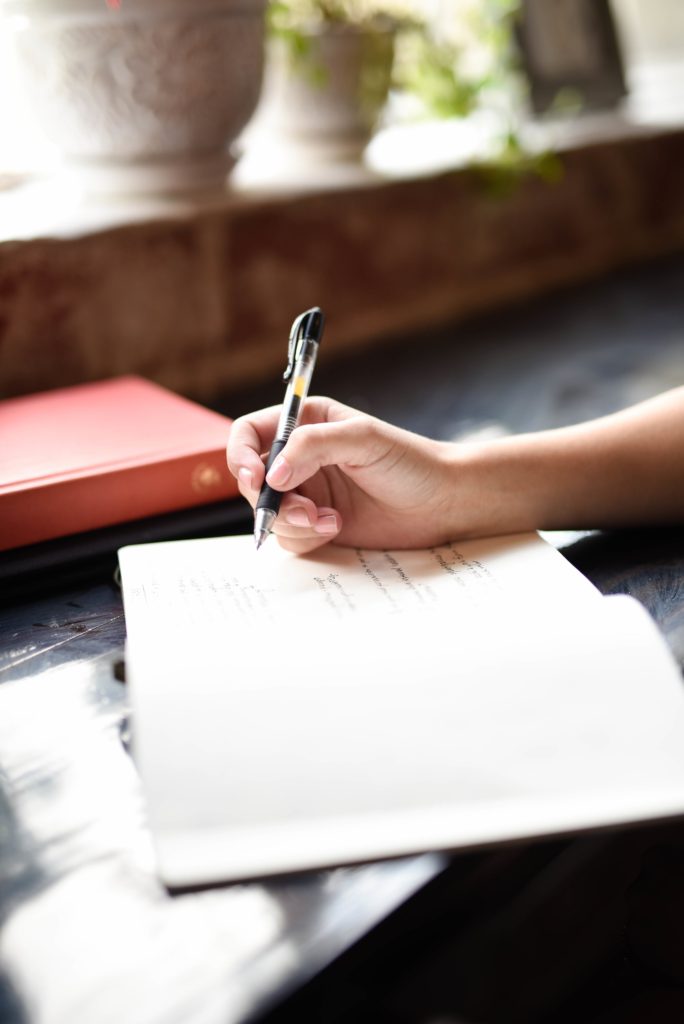
Journaling is another way to practice mindfulness as it allows us to record our thoughts and feelings, while helping us be more in control and aware of the present moment. Journaling can be done in many different ways and for different reasons (goal setting, creativity, healing, etc.).
It’s a powerful technique that helps to release stress and anxiety by simply writing about it, and promoting self-knowledge and emotional healing.
Here’s what you can do:
Start journaling now. It can be as simple as a gratitude journal, a task journal, intention setting journal, etc.
If you’re not sure where to start, download my “daily journaling prompts for stress and anxiety.” These are not only great for getting you started, but they also help alleviate anxiety and stress. Enter your info below to get started.
FREE Yoga Nidra for Anxiety
Click the button below to get your meditation right in your inbox.
